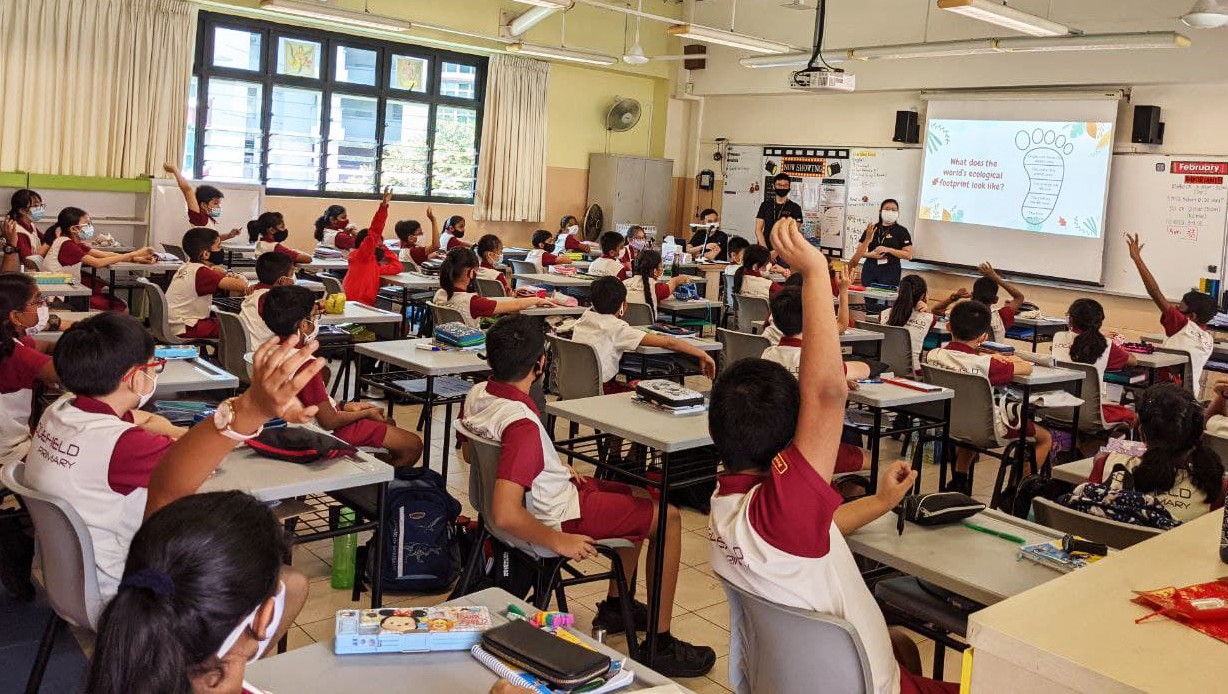Nurturing young eco-stewards
Distinguished by its mission and inter‐disciplinary approach to foster sustainability education and environmental stewardship, the NUS Ridge View Residential College (RVRC) offers an annual module, Understanding and Critiquing Sustainability, for students to explore multi-faceted sustainability issues.
By going beyond classroom learning, RVRC students are able to work on projects that address local sustainability problems in Singapore. Through inquiry into sustainability issues from different disciplinary perspectives, analysis of problems in real‐life settings and engagement with key stakeholders to implement sustainability solutions, they are encouraged to develop change agent capacities.
Research has shown that sustainability education from a young age is associated with long-term environmental consciousness. Hence, two groups of RVRC Year 1 students recently embarked on group projects to design and test toolkits that enhance the awareness and sustainability practices of primary school students.
Recycling plastics
Kenneth Chow (NUS Computing), Myron Neo (NUS Computing), Karan Bhatia (NUS Business School) and Rachel Lim (NUS Arts and Social Sciences) from the first team chose to address the knowledge gap about plastics recycling. According to the National Environment Agency, Singapore does not recycle 96 per cent of the plastic waste it generates.
The team conducted a pre-survey at three primary schools, and discovered that while students use plastic items frequently, they do not practise recycling often or correctly. This was partly due to the lack of knowledge about the different plastic types and their recyclability.
“We also interviewed science teachers at the primary schools to get some insights into their science syllabus and environment club initiatives,” said Kenneth.
Myron shared that after research on possible strategies, the team crafted an interactive awareness workshop anchored by a card game to educate children on the different plastic types -- and how to recycle them correctly. The card game included a repetitive learning pattern that prompted participants to correctly identify the plastic code and recyclability of commonly used or single-use plastic items such as drink bottles, containers and bubble tea cups.
“With the positive results and feedback garnered from the participants, the primary school teachers from the three schools have expressed their interest in adopting the workshop and game for their use,” said Rachel.
Environmental impact
Amelia Chong and Arnav Gupta (both from NUS Computing), Binson Koh (NUS Business School) and Choo Yan Qi (NUS Arts and Social Sciences) from the second group focused on deepening the primary school students’ understanding of their individual and collective impact on the environment.
“To enable these students to plan and commit to an action plan for reducing their individual environmental footprint, we designed a workshop to identify practical ways for Primary 5 students to understand, measure and reduce their individual environmental footprint,” said Amelia. She added that the team incorporated interactive art components tailored specifically for this target age group.
The group conducted their workshop at Edgefield Primary School for two Primary 5 classes, with a total of 60 participants. The workshop results indicated that 92 per cent of the participants displayed an enhanced understanding of individual resource consumption using a ‘Footprint’ visualisation tool, and its implications for planetary resources as embodied by the concept of ‘Earth Overshoot Day’.
Participants agreed that the contents were relevant and integrated with their school sustainability education syllabus. The most important and impactful measure of workshop success was its effectiveness in rallying a change in the students’ daily lives, documented over a span of three weeks.
As with the first team, Edgefield Primary School has requested for the workshop materials to be shared with them for integration into their own sustainability syllabus.
Translating both projects from the concept phase to actual implementation was no mean feat for the two RVRC groups. Challenges included the need for design and development of customised material for primary school students, and the lead time required to seek and gain permission for access to the schools to conduct the workshop.
Careful design of activities to ensure safe distancing and compliance with safety measures were also required, especially for the interactive components.
True to the college’s commitment in enhancing sustainability awareness, these RVRC projects highlighted the belief that one is never too young to become an eco-steward and start making a positive impact.
By RVRC Year 1 students Kenneth Chow, Myron Neo, Karan Bhatia, Rachel Lim, Amelia Chong, Arnav Gupta, Binson Koh, and Choo Yan Qi.



